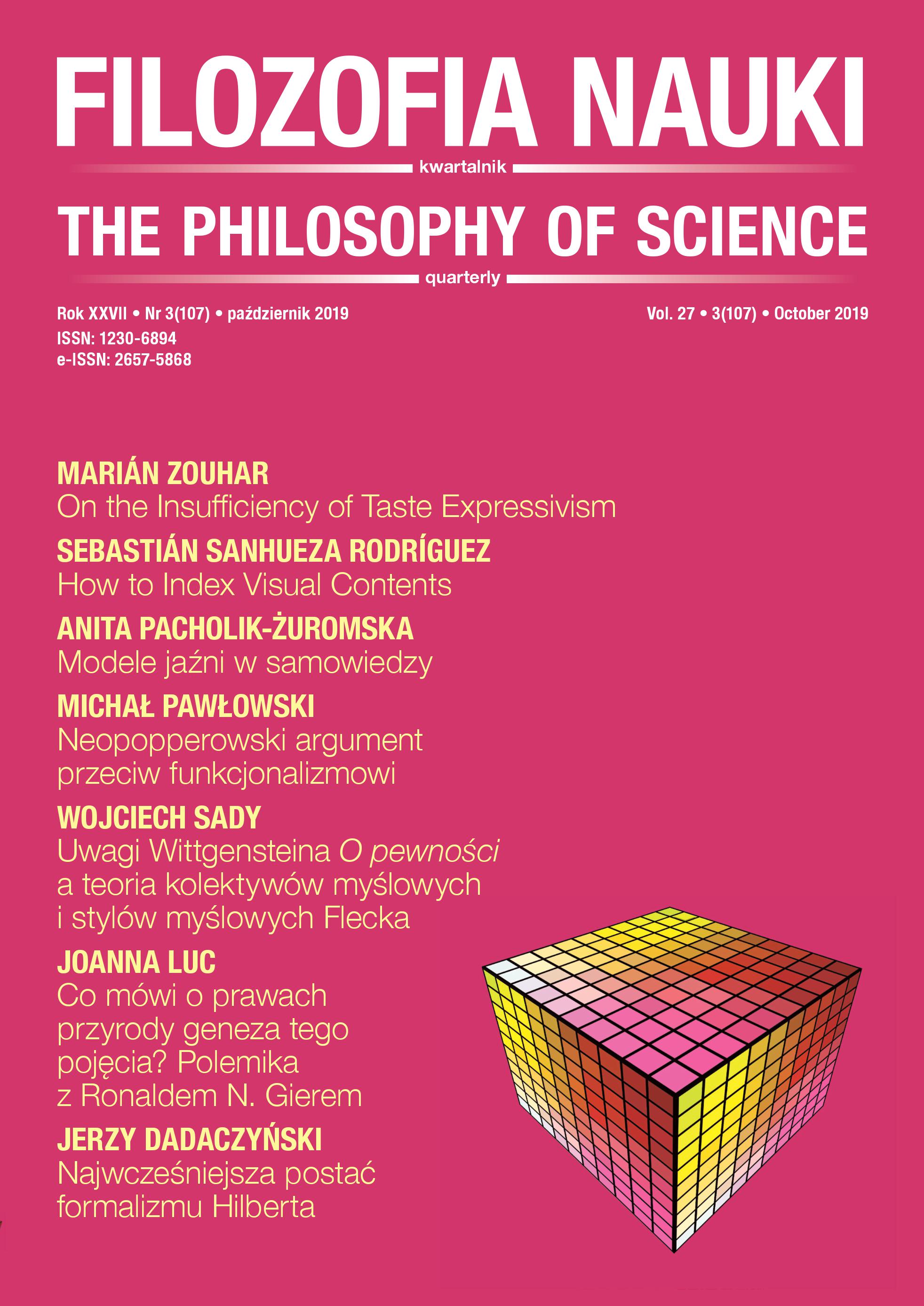On the Insufficiency of Taste Expressivism
DOI:
https://doi.org/10.14394/filnau.2019.0015Słowa kluczowe:
contextualism, doxastic disagreement, evaluative attitude, non-doxastic disagreement, taste expressivismAbstrakt
It is possible to construct situations (with a suitable kind of setting) in which one speaker utters “This is tasty” and another one responds with “That’s not true.” The aim of this paper is to motivate the idea that typical (broadly) expressivist accounts of taste disagreements are unable to explain such situations (although some of them can successfully explain disagreements in which another kind of dissent phrase — like “Nuh-uh” — is employed). This is because utterances of “That’s not true” are typically used to ascribe falsehood to propositions. Taste expressivism has it, however, that when one utters “This is tasty,” one typically manifests her evaluative attitude (which is non-propositional) toward something rather than describes what attitude she bears toward that thing. Another aim of the paper consists in proposing an alternative account of taste disagreements. It is close to taste expressivism in the case of disagreements in which speakers respond with “Nuh-uh” but departs from it in situations in which they respond with “That’s not true.” The account is developed within a contextualist framework according to which taste utterances express contextually enriched propositions that contain judges who evaluate things as tasty or not.
Bibliografia
Boisvert D. (2008), “Expressive-Assertivism,” Pacific Philosophical Quarterly 89(2), 169-203. https://doi.org/10.1111/j.1468-0114.2008.00315.x
Buekens F. (2011), “Faultless Disagreement, Assertions and the Affective-Expressive Dimension of Judgments of Taste,” Philosophia 39(4), 637-655. https://doi.org/10.1007/s11406-011-9318-5
Clapp L. (2015), “A Non-alethic Approach to Faultless Disagreement,” Dialectica 69(4), 517-550. https://doi.org/10.1111/1746-8361.12104
Copp D. (2001), “Realist-Expressivism: A Neglected Option for Modal Realism,” Social Philosophy and Policy 18(2), 1-43. https://doi.org/10.1017/S0265052500002880
Duží M., Jespersen B., Materna P. (2010), Procedural Semantics for Hyperintensional Logic: Foundations and Applications of Transparent Intensional Logic, Dordrecht: Springer. https://doi.org/10.1007/978-90-481-8812-3
Egan A. (2010), “Disputing about Taste” [in:] Disagreement, R. Feldman, T. A. Warfield (eds.), Oxford: Oxford University Press, 247-286. https://doi.org/10.1093/acprof:oso/9780199226078.003.0011
Egan A. (2014), “There’s Something Funny about Comedy: A Case Study in Faultless Disagreement,” Erkenntnis 79(Supplement 1), 73-100. https://doi.org/10.1007/s10670-013-9446-3
Eriksson J. (2014), “Hybrid Expressivism: How to Think about Meaning” [in:] Having It Both Ways: Hybrid Theories and Modern Metaethics, G. Fletcher, M. Ridge (eds.), Oxford: Oxford University Press, 149-170. https://doi.org/10.1093/acprof:oso/9780199347582.003.0007
Finlay S. (2005), “Value and Implicature,” Philosophers’ Imprint 5(4), 1-20.
Fletcher G. (2014), “Moral Utterances, Attitude Expressions, and Implicature” [in:] Having It Both Ways: Hybrid Theories and Modern Metaethics, G. Fletcher, M. Ridge (eds.), Oxford: Oxford University Press, 173-198. https://doi.org/10.1093/acprof:oso/9780199347582.003.0008
Glanzberg M. (2007), “Context, Content, and Relativism,” Philosophical Studies 136(1), 1-29. https://doi.org/10.1007/s11098-007-9145-5
Gutzmann D. (2016), “If Expressivism Is Fun, Go for It!” [in:] Subjective Meaning: Alternatives to Relativism, C. Meier, J. van Wijnberger-Huitink (eds.), Berlin: de Gruyter, 21-46.
Huvenes T. T. (2012), “Varieties of Disagreement and Predicates of Taste,” Australasian Journal of Philosophy 90(1), 167-181. https://doi.org/10.1080/00048402.2010.550305
Karczewska N. (2016), “Disagreements about Taste as Metalinguistic Negotiations — Some Critical Remarks,” Filozofia Nauki 24(1) [93], 27-39.
Kölbel M. (2002), Truth without Objectivity, London—New York: Routledge. https://doi.org/10.1111/j.1933-1592.2005.tb00467.x
Lasersohn P. (2005), “Context Dependence, Disagreement, and Predicates of Personal Taste,” Linguistics and Philosophy 28(6), 643-686. https://doi.org/10.1007/s10988-005-0596-x
López de Sa D. (2008), “Presuppositions of Commonality: An Indexical Relativist Account of Disagreement” [in:] Relative Truth, M. García-Carpintero, M. Kölbel (eds.), Oxford: Oxford University Press, 297-310. https://doi.org/10.1093/acprof:oso/9780199234950.003.0014
MacFarlane J. (2014), Assessment Sensitivity: Relative Truth and its Applications, Oxford: Oxford University Press. https://doi.org/10.1093/acprof:oso/9780199682751.001.0001
Marques T. (2015), “Disagreeing in Context,” Frontiers in Psychology 6(257), 1-12. https://doi.org/10.3389/fpsyg.2015.00257
Marques T., García-Carpintero M. (2014), “Disagreement about Taste: Commonality Presuppositions and Coordination,” Australasian Journal of Philosophy 92(4), 701-723. https://doi.org/10.1080/00048402.2014.922592
Recanati F. (2007), Perspectival Thought: A Plea for (Moderate) Relativism, Oxford: Oxford University Press. https://doi.org/10.1093/acprof:oso/9780199230532.001.0001
Richard M. (2008), When Truth Gives Out, Oxford: Oxford University Press. https://doi.org/10.1093/acprof:oso/9780199239955.001.0001
Ridge M. (2009), “Moral Assertion for Expressivists,” Philosophical Issues 19(1), 182-204. https://doi.org/10.1111/j.1533-6077.2009.00166.x
Schaffer J. (2011), “Perspective in Taste Predicate and Epistemic Modals” [in:] Epistemic Modality, A. Egan, B. Weatherson (eds.), Oxford: Oxford University Press, 179-226. https://doi.org/10.1093/acprof:oso/9780199591596.003.0007
Schroeder M. (2010), Noncognitivism in Ethics, London–New York: Routledge. https://doi.org/10.4324/9780203856291
Silk A. (2016), Discourse Contextualism: A Framework for Contextualist Semantics and Pragmatics, Oxford: Oxford University Press. https://doi.org/10.1093/acprof:oso/9780198783923.003.0003
Strandberg C. (2012), “A Dual Aspect Account of Moral Language,” Philosophy and Phenomenological Research 84(1), 87-122. https://doi.org/10.1111/j.1933-1592.2010.00447.x
Tichý P. (1979), “Existence and God,” The Journal of Philosophy 76(8), 403-420. https://doi.org/10.2307/2025409
Wright C. (1992), Truth and Objectivity, Cambridge, MA: Harvard University Press.
Zeman D. (2016), “Contextualism and Disagreement about Taste” [in:] Subjective Meaning: Alternatives to Relativism, C. Meier, J. van Wijnberger-Huitink (eds.), Berlin: de Gruyter, 91-104.
Zouhar M. (2018), “Conversations about Taste, Contextualism, and Non-doxastic Attitudes,” Philosophical Papers 47(3), 429-460. https://doi.org/10.1080/05568641.2018.1450159



















 Filozofia Nauki | ISSN 1230-6894 | e-ISSN 2657-5868
Filozofia Nauki | ISSN 1230-6894 | e-ISSN 2657-5868